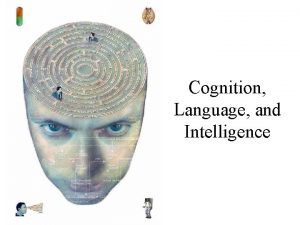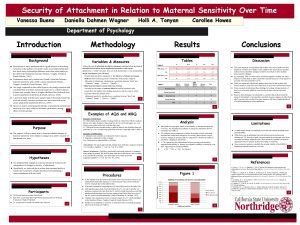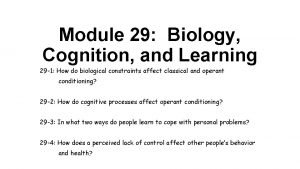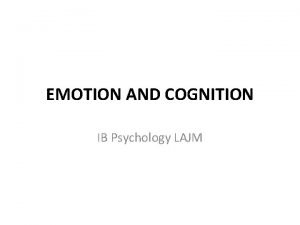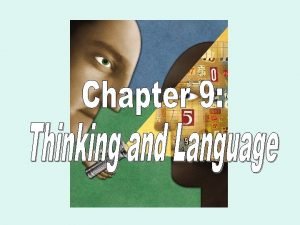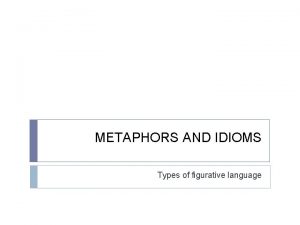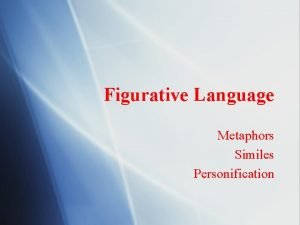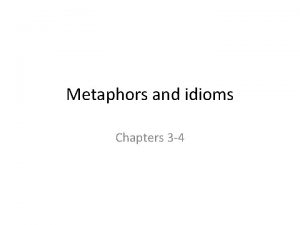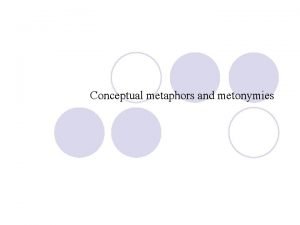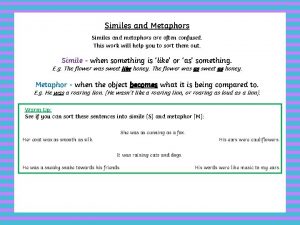METAPHORS Analogy Language and Cognition Daniella Ferrari Lucas











- Slides: 11

METAPHORS Analogy, Language and Cognition Daniella Ferrari Lucas Silva Natália Grandi

CONTEXTUALIZING • This presentation is based on: • The Contemporary Theory of Metaphor, by George Lakoff (1993) • The Cognitive-Linguistic Revolution in Metaphor Studies, by Gerard Steen

• Cognitive-linguistic approach to metaphor launched by Lakoff and Johnson (1980) • dominant traditional views held that metaphor was an isolated, seldom occurring poetic or rhetorical quirk; • Lakoff and Johnson claimed that metaphor is not a deviant phenomenon in language but a fundamental cornerstone in cognition.

IN CLASSICAL THEORIES OF LANGUAGE • The word “metaphor” was defined as a novel or poetic linguistic expression where one or more words for a concept are used outside of its normal conventional meaning to express a “similar” concept. • It was seen as a matter of language not thought • Everyday language had no metaphor • Metaphor used mechanisms outside the realm of everyday conventional language

• Cognitive linguists consequently claim that metaphor is not the deviant language of poets, politicians, and patients, as was the dominant view, but one basic building block of a lot of language, thought, and communication. • Metaphor is a major and indispensable part of our ordinary, conventional way of conceptualizing the world, and that our everyday behavior reflects our metaphorical understanding of experience

LOVE IS A JOURNEY • Imagine a love relationship described as follows: Our relationship has hit a dead-end street. • love is being conceptualized as a journey • the relationship is stalled • the lovers cannot keep going the way they've been going • they must turn back • or abandon the relationship altogether

LOVE IS A JOURNEY • The metaphor involves understanding one domain of experience, love, in terms of a very different domain of experience, journeys. • Look how far we’ve come. • It's been a long, bumpy road. • We can’t turn back now. • We’re at a crossroads. • We may have to go our separate ways. • The relationship isn’t going anywhere. • These are ordinary, everyday English expressions. They are not poetic, nor are they necessarily used for special rhetorical effect.

• Metaphorical expressions are not in language, but in thought: they are general mappings across conceptual domains • The mapping is the set of correspondences TARGET-DOMAIN IS SOURCE-DOMAIN or TARGET-DOMAIN AS SOURCE-DOMAIN

EXAMPLES • time as motion • time can fly • ideas as food • ideas need to be digested • arguments as war • arguments can be won or lost • organizations as plants • organizations can grow or need to be pruned

CROSSING MAP OF CONCEPTUAL DOMAINS: AN EXAMPLE “A verdade é como um leão; você não precisa defendê-la. Deixe-a solta, e ela se defenderá a si mesma. ” Cito a frase de Santo Agostinho para fazer um paralelo com o Programa Escola sem Partido: desembaraçado das mentiras que seus adversários espalham para enredá-lo perante a opinião pública, ele se defende por si só. Programa Escola sem Partido acaba com cooptação da esquerda. Miguel Nagib, Especial para a Folha de São Paulo, 11/09/2016. DOMÍNIO ALVO: VERDADE DOMÍNIO FONTE: LEÃO Autossuficiente / se impor Animal que consegue se defender “Publicar” / deixar público Soltar Animal feroz Mentiras Preso Adversário “Prendedor”

• The explanation of this pervasive and systematic presence of metaphor in thought is that the former, ‘target’, concepts are typically abstract, less well understood and hard to delineate in comparison with the latter, ‘source’, concepts, which are typically more concrete, better understood and easier to specify.
 Daniella ferrari
Daniella ferrari Chapter 7 cognition thinking intelligence and language
Chapter 7 cognition thinking intelligence and language Chapter 7 quiz cognition thinking intelligence and language
Chapter 7 quiz cognition thinking intelligence and language Cognition language and intelligence
Cognition language and intelligence Daniella meeker
Daniella meeker Daniella meeker
Daniella meeker Daniella farkash
Daniella farkash Daniella dahmén
Daniella dahmén Module 29 biology cognition and learning
Module 29 biology cognition and learning Emotion and cognition ib psychology
Emotion and cognition ib psychology Cognition and personalization
Cognition and personalization Cognition refers to
Cognition refers to



